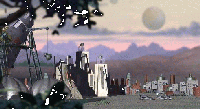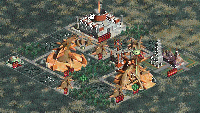Hi, Ho! Hi, Ho! it’s off to Gallius we go!
Come me hearty comrades, venture forth with me your colony commander as we descend upon the untamed frontiers of Gallius IV. Where, with the help of our skill or our weaponry, we will subdue our opponents’ feeble attempts at colonization and claim this planet for our own. Follow me oh ye multitudinous maggots for the honor of our planet: JkNd-d!
Sometime in the distant future,
long after man gained the ability to travel among and conquer the stars, at
a time when inter-spacial politics and colonization is dominated by the presence
of the eight races of ChCh-t, Cyth, Humans, Maug, Tarth, Re’Lu,Uva Mosk and
Skirineen, there appears a whole new planet known simply as Gallius IV. At a
time when each species is desperately in the need to colonize and exploit the
resources of a new and untamed world, the single, shiny, habitable glimmer of
colonizing hope for all the species is Gallius IV. The planet however can only
be occupied and controlled by a single race. Knowing this, all six races shortly
attempt to blow each other out of space in a mad dash to gain a monopolistic
hold on the planet. Being somewhat equally matched in space, however, leads
the conflict into a (gasp!) Deadlock! In a last desperate attempt to
finally colonize the planet, six of the warring races put down their arms in
space and agree to take the conflict straight down to the planet, which they
will gain control of once they have accomplished one of two objectives. All
races have the option of either being the first race to build a specified number
of City-Centers on their territories or being the only race left on the planet
after the dust settles. Such are the rules. Oh, and there is to be no consorting
with the underground market of the Skirineen traders as they have not signed
the Treaty of Gallius IV allowing them to participate in this planetary conflict.
Any colony leader found dabbling in the black market will face severely scandalous
reprisals. Such are the Rules.
With this in mind, let us begin to examine this Deadlock in greater detail.
Deadlock, is a turn-based strategy game of city-building, planetary colonization, and war. It is a hybrid creation in the nature of Sim-City and Sid Meier’s Civilization only reduced in scope and complexity. Placed upon a strange new world with a handful of colonists and resources, the player must, through the construction of city structures and the acquisition of territories, exploit the natural resources of the planet in an attempt to out-produce or outgun his opponent. The exploitation of resources is achieved through the construction of Farms to produce food, Surface Mines to dig out minerals, and Power Plants to produce energy. Soldiers and Weapons of different kinds are acquired through the Factory, the City Center, the Airport, and a host of other such buildings that allow for the production of specific military types. To expand or improve upon these resources the player is also given the ability to build Universities, Tech Labs and Collectives, where the best minds of the colony butt heads (and do some research too!) to bring about new technologies that either improve on the existing technology or allow for the production of the entirely new machines. Thus, each territory controlled by the player must utilize such resources in order to expand his sphere of influence.
To manage the colonies, the leader is given two views of the action, the planetary and the territorial. The planetary view allows the player to view the topography of the entire planet, or to transfer resources and mobile units, such as soldiers and colonists, between territories to either make war or make babies, respectively. This overall view brings about the feelings of being caught up in the war for a civilization. The territorial view, where most of the work is done, is where the player can build structures, allocate resources, set tax rates, dabble the black market (tsk! tsk!), handle research, and basically exercise the powers of a despotic mayor leading his Sim-base. It is in here, also that the mayor…er player can deal with the lowest common denominator, the colonists.
 The colonists and their specific
The colonists and their specific
characteristics differ from race to race and play a large role in defining the
player’s overall strategy in the game. Each race’s ability either aids in production
or in war. Some such abilities are, the psychic abilities of the Cyth which
can be used in war, the curious abilities of the Maug that make for faster research,
the extremely reproductive abilities of the ChCh-t that allow for great population
explosions, and the economic savvy of the Humans that allows for better money
management because certain things are cheaper. Along with the strength come
the weakness, such as the Humans’ susceptibility to scandals, the Tarths’ absolute
stupidity (more headbutt! less research), and the Maug colonists’ ever vacillating
morale that can slow work down. The morale of the colonists plays the center
role in all of this. A happy colonist is a productive colonist, so the leader
must keep them happy. In order to do this, Deadlock also allows for the
construction of museums, art complexes, and entertainment complexes, that raise
the morale points of the colonists as they provide cheap (yeah, right) and easy
recreation.
Once the colonists are satiated, the player must then think about further expansion of influence. At this point research comes into play. Research in the game follows a branching tree of discovery, where one new discovery leads to a host of related discoveries, allowing for the production of more powerful military units or new, more efficient structures. A cause and event map of the discoveries is provided in the manual, allowing the player to choose the path of his research. As research improves the situation, the player must move onto military considerations. Whatever the player’s strategy in the game, the military must play a role, either for offense or defense. With the help of research, military units can be utilized to either completely eradicate an opponent through violent confrontation or to slowly tear down the opponents little empire by stealing technologies through spying or lowering moral by creating sedition. The player can also use a certain amount of diplomacy when dealing with his opponents to create military and trade alliances, to make war, or to just make a nuisance of oneself. Whatever the choice, it is entirely up to the player.
The Player’s choice, in fact, can literally “create” the backdrop for the game. Before the start of any new game, the player can adjust a multitude of options, such as the size of Gallius IV, it’s look, the number and kind of opponents, the special abilities of each race, etc. This allows for a non-linear playing style making for a whole new and unpredictable game each time. Although, for real unpredictability, one needs another human to play against. Deadlock allows for another, and another and another and another….
Multi-player games is one of Deadlock‘s specialties that, if anything, is probably going to propel Deadlock to it’s success. Deadlock can be played with other players through the Internet, a LAN, a modem serial connection or a null modem. On the Internet, the game is supported on Mplayer, Total Entertainment Network or the Earthlink Networks. Deadlock can also be played with only one CD amongst numerous people, although certain features will be turned down and people without the CD will be playing demo rules which restrict them from performing certain game actions. Since the planets being played on are created entirely at random each time a new game is started, playing over e-mail is simply out of the question, as the same configuration on two separate machines, won’t create the same planet and hence not the same game either.
Thus, as it rests Deadlock is a good game. It’s host of complex details and features allow for a rich and ever changing game with a high replayability value that is simply multiplied by it’s multi-player potential. However, while Deadlock does nothing wrong, it really doesn’t add anything new to the particular genre it represents. In every way it is a good, turn-based, strategy game of colonization. That, however, is it. No new niches are being carved and no new innovations are being dared. Deadlock is an effective production of the tried and true, which in a market rife with over-priced, non-rewarding clones of great ideas is an achievement in itself.
Deadlock by itself will provide many hours of fun and will grow to become a minor addiction, however it will really shine when played on a multi-player network, which is what it was built for. Multiplayer Deadlock will send any predictions of it’s addictivity (if that’s a word) right down the toilet. It’s host of features are built to cater to the human need of conquest and subjugation of one’s fellow neighbor. A need which it will feed quite nicely with minimum eye strain.
-
Good Game.
-
Perfect for multiplayer.
-
Nothing really new.







